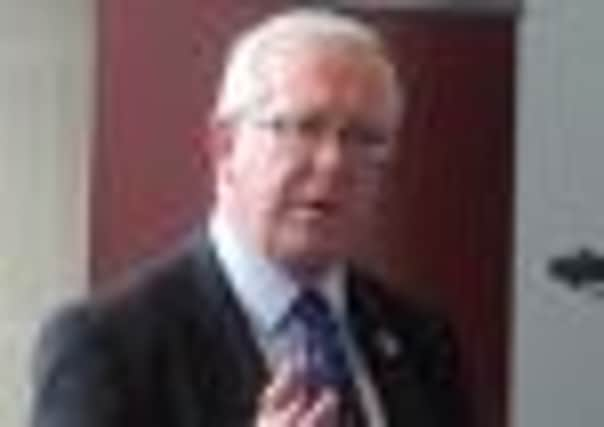Scottish independence: SNP could lose in referendum vote, minister concedes


Raising the scenario of defeat in the planned 2014 referendum for the first time, Bruce Crawford, the SNP’s cabinet secretary for government strategy, predicted the country could expect no let-up in the doubts over its future if it voted “no” to independence, given the lack of clarity from pro-Union parties.
Addressing a Scotsman conference on the referendum, Mr Crawford claimed his opponents’ failure to set out what form of boosted devolution they backed prior to a referendum was “profoundly undemocratic”. They had a responsibility to set out clearly what their plans for reform would be, or face the risk of not being taken seriously, he said.
Advertisement
Hide AdAdvertisement
Hide AdRaising the prospect of a no vote for the first time, Mr Crawford said: “If we lose the referendum – and I don’t think we will – but if we lose, the question is what powers are we getting? VAT? Oil taxes? Welfare? Right now, the Unionists can’t answer that question. The uncertainty lies with those who oppose our proposals on independence.”
In the strongest indication yet that the SNP is set to include a second question in the referendum on beefed-up devolution, Mr Crawford warned all politicians would be playing “fast and loose” with voters if they did not include a third way on the ballot paper if a “groundswell” of support for such a model was found.
“It is simply unacceptable to go into a referendum on the greatest question our nation has faced in over 300 years without telling the people what they are voting for. ‘Only when you vote No can we work what happens next’ is the only position the pro-Union parties seem to share. This proposition is everything our referendum must not be. It is unfair to the people… it is profoundly undemocratic,” he said.
However, Mr Crawford’s claim that his opponents were creating uncertainty was undermined by a report by the Business for New Europe group which concluded that Scotland’s status as an EU nation, post independence, remained “unclear”.
It warned Scotland could be asked to reapply as a new accession state, and forced to negotiate anew with Brussels on its status.
Mr Crawford’s comments came in a major conference at The Scotsman yesterday, entitled “A Question of Independence: How will the referendum work?”, which also heard from legal, constitutional and political experts on the way the historic vote will be conducted.
It comes as the Scottish and UK governments are locked in talks over the arrangements for the poll. Mr Crawford confirmed the SNP’s view yesterday that, in order to ask its preferred question, it would require a transfer of powers from Westminster to Holyrood so it could enact the legislation for a referendum.
However, the two governments have not agreed about the timing, the wording or the franchise of the vote.
Advertisement
Hide AdAdvertisement
Hide AdIn his speech, Scottish Secretary Michael Moore said he was “perplexed” as to why the SNP continued to complicate the referendum with the possibility of a second question, given its backing for independence.
He said: “The Scottish Government wants independence. So why are they trying to confuse the issue with a second question on devolution?”
He added: “We are making an open and generous offer. The straightforward independence referendum that has been the First Minister’s mission in life. But it’s being met with complication, hesitation, and qualification. For whatever reasons the Scottish Government is placing barriers on what should be a clear and straight road.”
Mr Moore said his party, the Liberal Democrats, had set up a home rule commission, to report back this autumn, on how to advance devolution. This, he said, would provide clarity from his party’s perspective on what powers it wanted at Holyrood.
Labour has set up its own commission to examine the case, but both it and the Conservatives have yet to reach a common view on whether powers at Holyrood should be increased.
All three pro-Union parties argue that, in any case, the issue can only be addressed once Scotland has decided whether or not to stay in the UK or not. Christine O’Neill, head of public law and regulatory at Brodies LLP, said she expected a deal to be done between the UK and Scottish Governments on sorting out the legality of the poll, saying it would be in neither party’s interests to allow it go to the courts.
Going to the courts would “raise problems for everyone” she said. Whatever the legal niceties of the referendum, the “politics is always going to be more important”. Ms O’Neill said that if the courts did get involved, the decision would rest with the Supreme Court.
The conference also heard from senior lecturer Dr Ailsa Henderson, of the University of Edinburgh’s School of Political Science, who provided evidence from the referenda in Quebec where, she said, the uncertainty around the poll had created negative economic consequences.
Advertisement
Hide AdAdvertisement
Hide AdAlan Trench, a constitutional expert with University College London, said the rest of the UK was “waking up” to the independence debate. If Scotland became independent, or even if it adopted “devo max”, he said there would need to be new arrangements to deal with the likely consequences.
He also warned Scotland needed to ensure the debate was conducted without rancour, or risk losing friends in England.